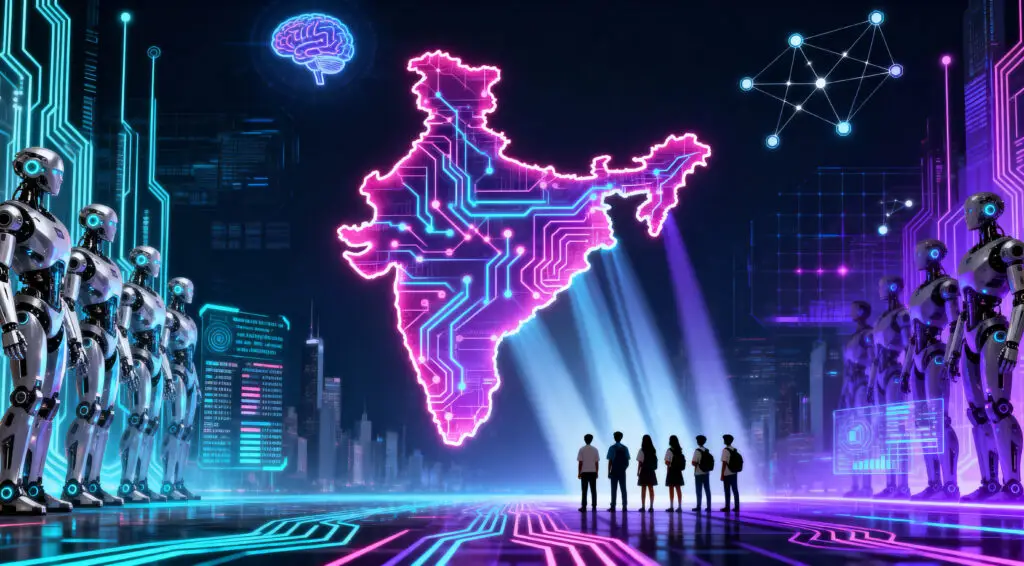Finance Minister Flags Critical AI Skills Shortage
India’s Finance Minister Nirmala Sitharaman has raised alarms about the growing gap between AI adoption and talent availability. Rapid industry integration of AI has outpaced workforce readiness, threatening to stall economic and technological momentum.
She emphasized that industries are embracing AI but lack AI-ready human resources to fully harness its benefits. Urgent collaboration between the government, academia, and private sector is needed to address this skills mismatch effectively.

Urgent Collaboration Needed to Scale Workforce Training
Sitharaman called for immediate partnerships between educational institutions and industries to expand AI-specific training programs. She stressed that AI can offer powerful, localized solutions for infrastructure challenges without requiring population relocation.
AI-driven solutions can help cities manage urbanization more efficiently, providing flexible and scalable innovations. This requires a skilled workforce capable of developing and deploying AI systems effectively across diverse sectors.
Regulatory Frameworks Must Match Technological Speed
The Finance Minister highlighted that regulatory guardrails must evolve at the same pace as AI technologies. Without clear frameworks, innovation risks outpacing governance, potentially leading to ethical, privacy, and security concerns.
She stressed that regulations should ensure responsible AI deployment while encouraging innovation. Balanced policies would protect workers and citizens while fostering continued technological advancement.
Recommended Article: Trump Shares Racist AI Video Targeting Schumer and Jeffries Amid Shutdown Threat
NITI Aayog Highlights Labor Market Disruptions
India’s NITI Aayog released a report warning that AI adoption will significantly reshape the labor market. Estimates suggest that 35–40% of current jobs globally could face automation, affecting emerging markets like India.
The think tank emphasized that while AI will create new opportunities, many clerical and routine jobs may become obsolete. Strategic planning for reskilling and redeployment is essential to minimize displacement effects.
Economic Survey Warns of Job Vulnerabilities
The Economic Survey 2024–2025 highlighted that automation could impact middle- and lower-wage workers most severely. Service-based sectors, particularly IT roles focused on repetitive tasks, face heightened vulnerability as businesses embrace AI.
Chief Economic Advisor V. Anantha Nageswaran stressed the importance of supporting institutions and revised curriculums. Preparing displaced workers during the transition period is critical before AI creates new employment opportunities.
Sam Altman Predicts Displacement in Customer Service Roles
OpenAI CEO Sam Altman recently stated that customer service positions would be among the first to be automated. Repetitive and scripted functions are easily replicated by AI, making these jobs highly susceptible to disruption.
He added that routine coding tasks may face similar risks, although creative and complex programming roles will likely persist. His comments coincide with OpenAI’s new collaboration with IndiaAI Mission to improve AI literacy nationwide.
IndiaAI Mission Partners With OpenAI for Education
India has become the second-largest market for ChatGPT, underscoring rapid AI adoption among users. To support this momentum, OpenAI and IndiaAI Mission have launched the first OpenAI Academy chapter outside the U.S.
This initiative aims to expand access to AI education, equipping students and professionals with essential skills. By building AI literacy, India can better prepare its workforce for future disruptions and opportunities.
Balancing Automation Risks With New Opportunities
While AI presents significant challenges, it also offers transformative opportunities across industries. Policymakers must balance automation risks with strategies that foster innovation, economic growth, and employment resilience.
India’s success will depend on proactive training initiatives, strong regulatory frameworks, and widespread educational reforms. Addressing the AI talent gap today ensures that the nation remains competitive in the evolving global economy.















